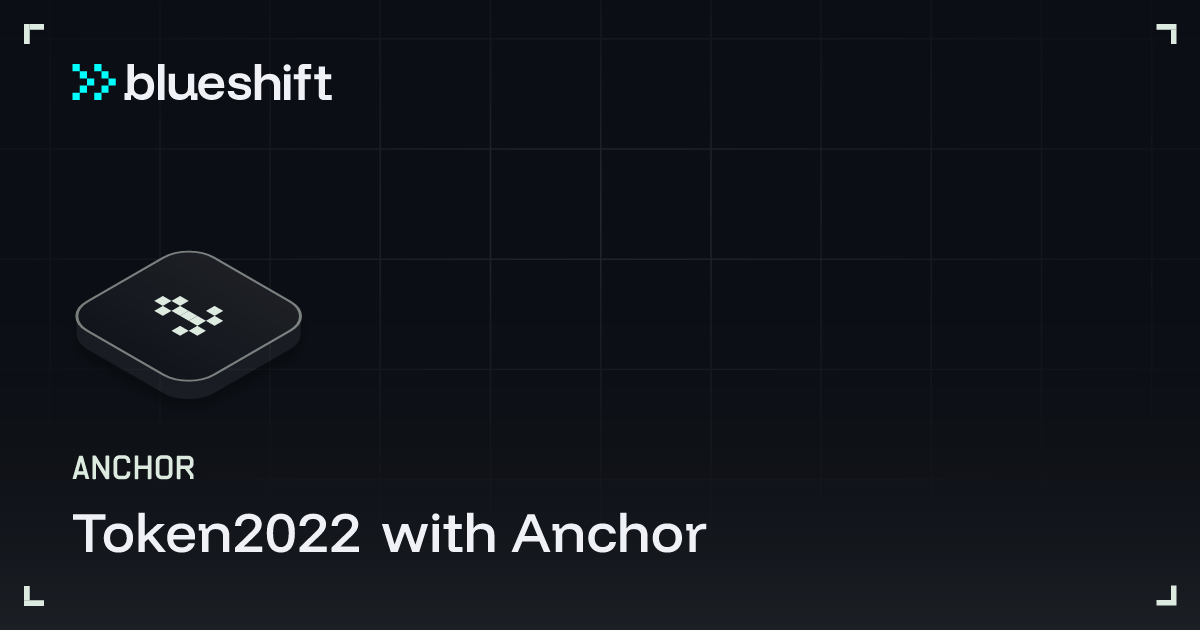The Token2022 Program

The Token2022 Program, also known as Token Extensions, is a superset of the functionality provided by the Token Program.
If you want to learn more about what additional functionalities are available and what are the differences with the Legacy token program, go follow this course
For anchor, everything token related can be found in the anchor-spl crate. For this reason, after having initialized an Anchor workspace we can just do:
cargo add anchor-splDon't forget to then update the idl-build feature that can be found into the [features] section of the Cargo.toml file of our program with idl-build = ["anchor-lang/idl-build", "anchor-spl/idl-build"]
Mint and Token Accounts
If you're familiar with Anchor, you'll know that they have a set of macros that help the user abstract away a lot of the complexities related to initializing accounts.
The same works here for Mint, Token and Associated Token accounts.
Mint Account with Extensions
Since Mint account with extensions have different size and are owned by a different program, Anchor created a new type of accounts that works independently if the Mint account is from the Legacy Token or from the Token2022 program.
To use them, we just need to import both the TokenInterface and Mint from the anchor_spl::token_interface like this:
use anchor_spl::token_interface::{TokenInterface, Mint};After that we can just do pub mint: InterfaceAccount<'info, Mint>, and specify that we want the mint to use the token_program account that we have in the account struct like this: mint::token_program = token_program and we are good!
Before diving into how to add extension to the mint account, this is how to create a mint with the Token2022 program:
#[derive(Accounts)]
pub struct CreateMint<'info> {
#[account(mut)]
pub signer: Signer<'info>,
#[account(
init,
payer = signer,
mint::decimals = 6,
mint::authority = signer.key(),
mint::token_program = token_program
)]
pub mint: InterfaceAccount<'info, Mint>,
pub system_program: Program<'info, System>,
pub token_program: Interface<'info, TokenInterface>,
}Now, luckily, Anchor has our back, and created some macros to add the most popular extensions directly in the initialize step like so:
#[account(
// ...init
extensions::metadata_pointer::authority = <target_account>,
extensions::metadata_pointer::metadata_address = <target_account>,
extensions::group_pointer::authority = <target_account>,
extensions::group_pointer::group_address = <target_account>,
extensions::group_member_pointer::authority = <target_account>,
extensions::group_member_pointer::member_address = <target_account>,
extensions::transfer_hook::authority = <target_account>,
extensions::transfer_hook::program_id = <target_pubkey>
extensions::close_authority::authority = <target_account>,
extensions::permanent_delegate::delegate = <target_account>,
)]
pub mint: InterfaceAccount<'info, Mint>,Associated Token Account with Extensions
Associated Token accounts comes with the ImmutableOwner extension by default. So the only difference between the creation of a Legacy or Token2022 Token Account is just the usage of the Interface Account.
Here's how to create an associated token account:
#[derive(Accounts)]
pub struct CreateAssociatedToken<'info> {
#[account(mut)]
pub signer: Signer<'info>,
pub mint: InterfaceAccount<'info, Mint>,
#[account(
mut,
associated_token::mint = mint,
associated_token::authority = signer,
associated_token::token_program = token_program,
)]
pub associated_token: InterfaceAccount<'info, TokenAccount>,
pub system_program: Program<'info, System>,
pub token_program: Interface<'info, TokenInterface>,
}Token Account with Extensions
The Token accounts doesn't come with any extension by default and it doesn't have any macro that helps us out. So using macros we can only create a normal Token2022 Token account.
Here's how to create a token account:
#[derive(Accounts)]
pub struct CreateToken<'info> {
#[account(mut)]
pub signer: Signer<'info>,
pub mint: InterfaceAccount<'info, Mint>,
#[account(
mut,
token::mint = mint,
token::authority = signer,
token::token_program = token_program,
)]
pub token: InterfaceAccount<'info, TokenAccount>,
pub system_program: Program<'info, System>,
pub token_program: Interface<'info, TokenInterface>,
}